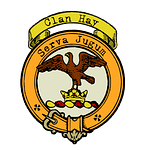Welcome back to "A Clan A Day Podcast," brought to you by BagTownClans.com. I'm your host, Colin MacDonald. Today, we explore the fascinating history of Clan Erskine, a family whose legacy is deeply intertwined with Scotland's tumultuous history. From their beginnings in Renfrewshire to their influence across politics, war, and the arts, Clan Erskine's story is one of loyalty, ambition, and resilience.
The name "Erskine" derives from the Barony of Erskine in Renfrewshire, south of the River Clyde. The name itself is thought to mean "green rising ground," reflecting the verdant landscapes of their ancestral lands. As early as the reign of Alexander II, Henry of Erskine held these lands, witnessing charters and cementing the family’s early prominence.
During the Wars of Scottish Independence, the Erskines were staunch supporters of Robert the Bruce. Sir Robert Erskine played a pivotal role in securing the succession of the Stewart dynasty, ensuring Robert II's claim to the throne. His loyalty earned him significant royal appointments, including Keeper of Stirling Castle and Chamberlain of Scotland.
The family's most notable claim arose in the 15th century when they asserted rights to the ancient Earldom of Mar. Through descent from Elyne, daughter of Gratney, the 7th Earl of Mar, the Erskines laid claim to this illustrious title. Although initially denied by James I, Mary, Queen of Scots, later restored the earldom to the family in gratitude for their guardianship during her youth. The 6th Lord Erskine became the 1st Earl of Mar in this new creation, marking a turning point in the clan’s history.
For generations, Clan Erskine served as guardians to Scotland's royal heirs. James IV, James V, Mary, Queen of Scots, and James VI all spent formative years under the protection of the Erskines. This responsibility was not merely ceremonial—it was a vital role in safeguarding the monarchy during periods of political unrest.
One striking example of this guardianship occurred in 1567. John Erskine, the 6th Lord and later the 1st Earl of Mar, carried the infant King James VI to his coronation amid attempts by rivals to seize the young king. The trust placed in the Erskines was a testament to their integrity and loyalty.
The Erskines left an indelible mark on Scotland’s architectural landscape. In 1497, Alexander Erskine constructed Alloa Tower, a stronghold that served as the clan’s chief seat for over 300 years. Other notable holdings included Braemar Castle, Kellie Castle, and the original Kildrummy Castle, a symbol of the Earldom of Mar. These structures were more than residences; they were symbols of the clan’s power and influence, standing resilient through centuries of conflict and political change.
The 11th Earl of Mar, known as "Bobbing John," was a controversial figure during the Jacobite risings. After initially supporting the Union of 1707, he felt slighted by his lack of political advancement under George I. This perceived insult led him to raise the Jacobite standard at Braemar in 1715, rallying an army of 10,000 to support James VIII (The Old Pretender).
The Earl’s military leadership, however, was less successful. At the Battle of Sheriffmuir, his forces fought to a stalemate, and the uprising eventually failed. Forced into exile, Mar’s title and lands were forfeited, only to be restored to the family a century later in 1824.
Clan Erskine’s impact extended beyond politics and war. John Erskine of Dun, a leading figure in the Scottish Reformation, was instrumental in advancing Protestant ideals and education. His contributions helped shape Scotland’s religious and intellectual landscape.
Additionally, members of the Erskine family held the prestigious office of Lord Lyon King of Arms, demonstrating their deep involvement in Scotland’s heraldic traditions.
Today, the Erskine legacy lives on through their cultural and historical contributions. Their chief, James Thorne Erskine, holds the titles of the 14th Earl of Mar and the 16th Earl of Kellie, maintaining the clan's prominence within the Scottish nobility.
From their ancestral seat at Alloa Tower to their influence in the Jacobite uprisings, Clan Erskine has been a cornerstone of Scottish history. Their story embodies the spirit of resilience, loyalty, and adaptability, making them a clan to be celebrated.
Thank you for joining us on this journey through the history of Clan Erskine. Be sure to tune in tomorrow for another episode of "A Clan A Day Podcast." I'm Colin MacDonald, and as always, Go n-éirí an bóthar leat!












Share this post